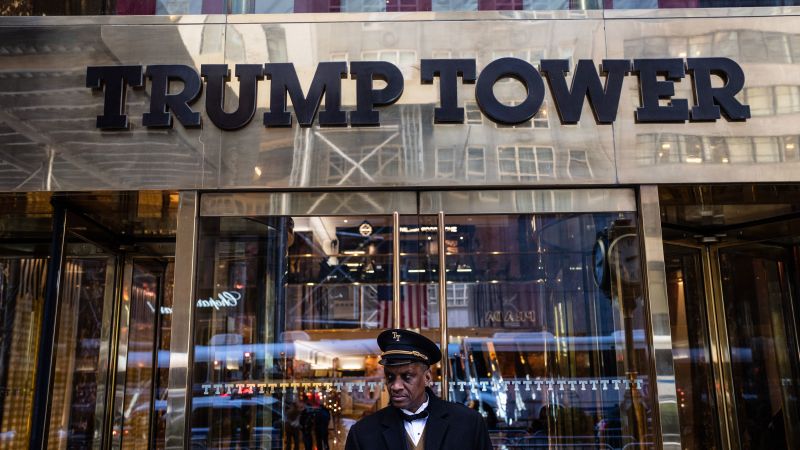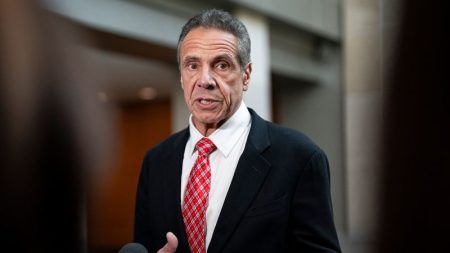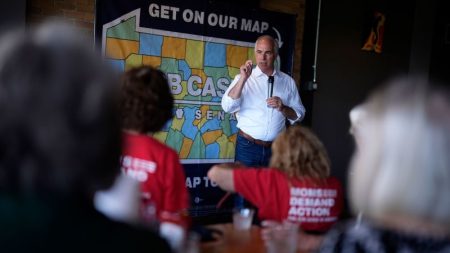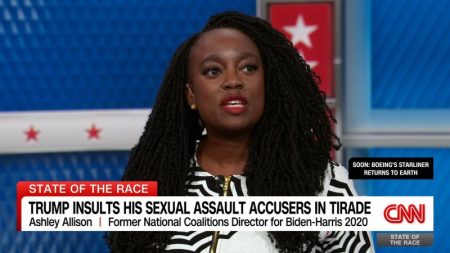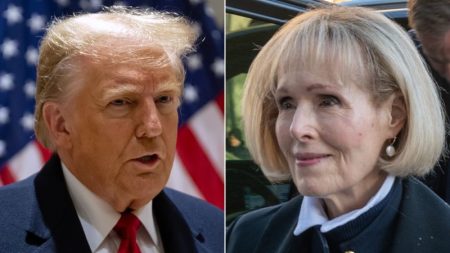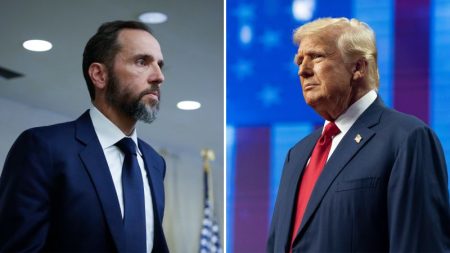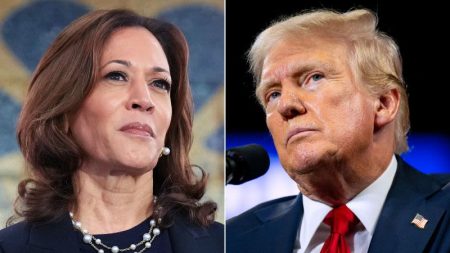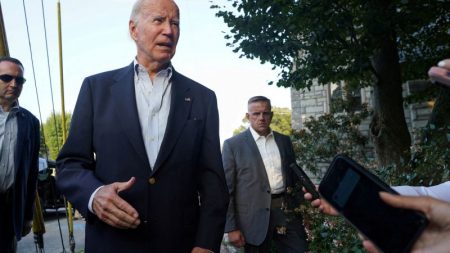Donald Trump’s legal team wrapped up the first week of his defense case in the New York civil fraud trial as it continues to build the former president’s defense around experts who offered a different interpretation of the rules the attorney general says Trump and his business violated to commit fraud.
Trump’s team presented six expert witnesses on topics like accounting, real estate and surety insurance as they fight the attorney general’s allegations – and Judge Arthur Engoron’s earlier ruling – that the company committed fraud.
Engoron, as he had indicated he would, rejected Trump’s request for a mistrial.
However, Engoron ruled in Trump’s favor frequently in the courtroom this week, allowing witness testimony and evidentiary submissions over objections from the New York attorney general’s office.
Engoron often attributed the lenient rulings to his effort to avoid a reversal or retrial of the case.
“There’s no jury, there’s no prejudice,” the judge said. “Allow them to present their defense.”
And in a victory for Trump, a New York appeals court temporarily blocked Engoron’s gag order on parties that prevented them from talking about his staff.
Here’s what to know from the week in court:
Donald Trump Jr. returns to the stand
Donald Trump Jr. was the first witness in the defense case Monday returning to the stand for a second time at trial.
Trump Jr., who is also a named defendant, offered the court a colorful history of the Trump Organization mostly cribbed from promotional materials posted on the company’s website.
The attorney general’s lawyers argued most of the promotional photo-laden testimony was irrelevant but Engoron overruled the objections, saying it was relevant and interesting.
In Trump Jr.’s narrative, his father built the family business by taking over dilapidated properties and using his skills as a “visionary” to turn them all into one of the best in the city, the country and in some cases the world.
“He’s an artist with real estate. He sees the things that other people don’t,” Trump Jr. said of his father.
In a win for Donald Trump, an appellate judge granted a stay Thursday temporarily blocking Engoron’s gag order that barred him and his lawyers from talking about the judge’s staff.
“Considering the constitutional and statutory rights at issue an interim stay is granted,” Associate Justice David Friedman of the First Judicial Department wrote in a summary statement after an emergency hearing held Thursday afternoon.
Engoron previously fined the former president twice for a total of $15,000 over his public gripes about the law clerk who sits next to the judge on the bench and passes him notes during trial.
Accounting expert says methods in Trump’s statements were compliant and disclosed
Accounting expert Jason Flemmons testified there are multiple ways to calculate asset valuations under governing accounting principles and Donald Trump’s financial statements used compliant methodologies – and to the extent that they didn’t, disclosures about those departures from accounting standards were included in the reports, which also made them compliant.
Flemmons, a certified fraud examiner who formerly worked for the Securities and Exchange Commission enforcement division, said that while 95% of assets listed on Donald Trump’s 2014 personal financial statement deviated from generally accepted accounting principles (GAAP), the statements properly disclosed the deviations on those statements.
Judge temporarily lifts gag order in Trump’s civil fraud trial
“I don’t believe that I identified any GAAP departures within these supporting materials that were not covered by disclosure in the accountant’s report [or] notes of the finals statements,” Flemmons said.
Flemmons said Mazars, the Trump Organization’s longtime accounting firm, was required under accounting standards to understand the company’s methodology for valuing assets and identify deviations, an apparent attempt to shift liability to them. He also testified that Mazars would have had enough information from the Trump Organization about the asset calculations to flag any concerns at the time.
Steven Collins, an expert on contract procurement, also testified briefly Thursday about Donald Trump’s winning bid for the General Services Administration contract for the Old Post Office building in Washington, DC, which he converted to a hotel. Collins said that records show that GSA officials were aware that Donald Trump’s financial statements contained GAAP deviations but awarded the Trump Organization the contract anyway.
The former president’s longtime friend and luxury real estate developer Steve Witkoff testified as an expert in real estate development earlier this week.
The two first met in the 1980s when Witkoff bought Donald Trump a ham and Swiss cheese sandwich at a New York deli at 3 a.m. because he didn’t have any money on him, Witkoff testified.
Donald Trump’s lawyers said Witkoff’s testimony as a developer who values assets in everyday business practice should lend credibility to how the former president has said he approached his own asset values in his personal financial statements. Witkoff testified that he values assets primarily based on their cash flow and what can be done with the property in the future.
He approaches the value of a project with an “opportunistic slant” that focuses on what value can be added to the property.
Dr. Steven Laposa testified he believed the attorney general’s civil fraud complaint is “flawed” because it alleges Donald Trump used inflated asset valuations on his statements of financial condition based on the assertion that market value appraisals are “true” benchmarks without considering investment values as a possibility.
An investment value is based on an investor or entity’s investment requirements rather than market norms so they can differ from market value because it depends on a set of investment criteria that are not necessarily typical of the market.
Asset valuations can vary widely, he said, and it’s “very common” for appraisers to disagree about the value of the same property, according to a real estate market analysis expert witness – a point the former president’s team has argued throughout the case.
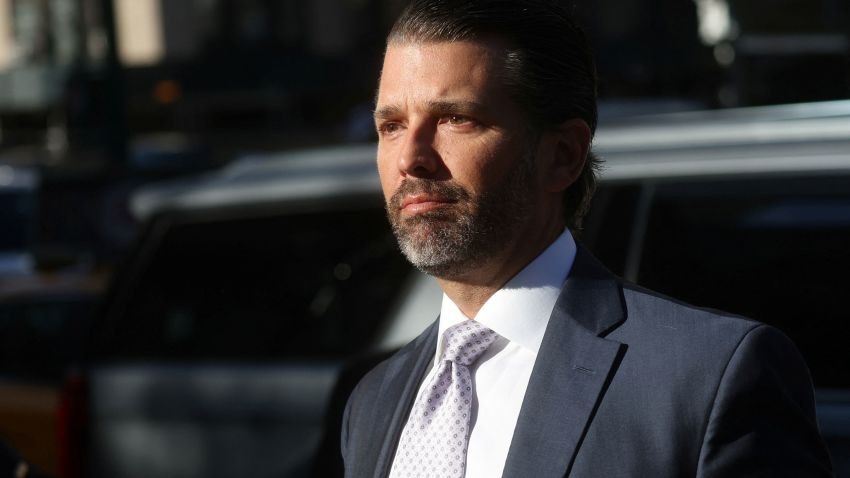
Donald Trump Jr. takes the stand for second time in civil fraud trial
But on cross examination Friday, Assistant Attorney General Louis Solomon poked holes in the expert’s assertion that the complaint was “biased” and “flawed” because the definition of estimated current market value and market value are the same.
And Donald Trump’s statements of financial condition state that the asset valuations in the financial statements are based on estimated current values.
Laposa said he had never seen that page of the former president’s financial statement before Solomon showed him on the stand Friday.
